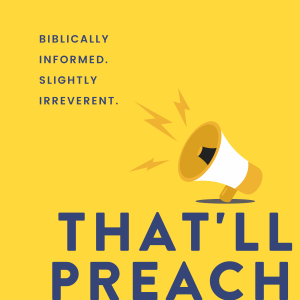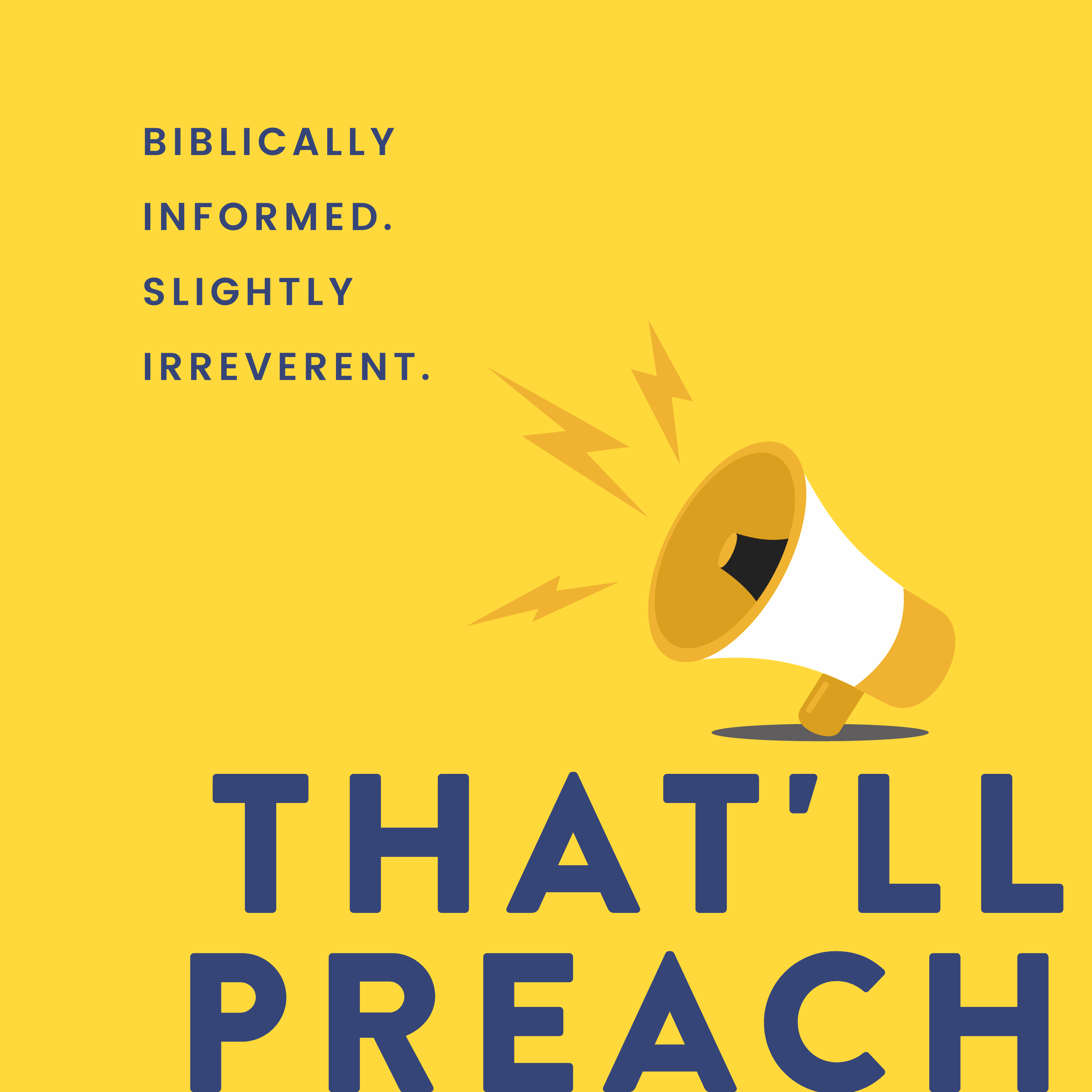Episodes

Tuesday Apr 02, 2024
Jesus Wants You to Steal From the Rich
Tuesday Apr 02, 2024
Tuesday Apr 02, 2024
In this episode we discuss a compelling case from the Scriptures and church theologians like John Calvin, Thomas Aquinas, and others about whether taking from the wealthy to feed the poor constitutes theft. We lay out a compelling case that God intends his creation to sustain the basic needs of his creatures. Therefore, every creature made in God’s image possesses rights over basic provisions. We also talk about Paul’s latent communism. Enjoy!
Show Notes
- Purchase 50 long-lasting, insecticide-treated nets to protect those living in malaria-stricken areas from infected mosquitos—for every 600 nets distributed, one child’s life is saved and 500 cases of malaria are prevented (Against Malaria Foundation)
- Deworm 200 children (Evidence Action)
- Provide clean water for 70 people for one whole year (Evidence Action)
- Protect 1000 people from iodine deficiency disorders (like brain damage) for a year (GAIN’s Salt Iodization Program)
- Provide 4 cataract surgeries to reverse blindness (Fred Hollows Foundation)
- Fund 416 antibiotic distributions to prevent blinding trachoma (Fred Hollows Foundation)
- Provide vitamin A supplements to prevent 90 children from going blind (Helen Keller Foundation)
- Provide 138 people with micronutrient fortification for one year (Sanku—Project Healthy Children)
Givewell.org (Charity Assessment Non-profit)
Thelifeyoucansave.org (Charity Assessment Non-profit)
Christiansforimpact.org (Christian Global Impact Non-profit)
Blessbig.org (Christian Global Impact Non-profit)
Support us on Patreon
Website: thatllpreach.io

Tuesday Mar 26, 2024
How Should Christians Think About Frozen Embryos?
Tuesday Mar 26, 2024
Tuesday Mar 26, 2024
There’s a lot of talk today about the ethics of frozen embryos in light of current events. This controversial subject deserves clear thinking that’s both sensitive to the real situations people encounter and the witness of the Scriptures. Paul and Bryan discuss recent documents from the Roman Catholic church, Donum Vitae and Dignitas Personae which argue against people “adopting” frozen embryos. Paul takes issue with this stance in a stimulating discussion about In Vitro Fertilization, bioethics, and the dignity of life. In short, Paul thinks the Roman Catholic church’s stance is insane. Don’t miss this episode!
Show Notes
Support us on Patreon
Website: thatllpreach.io

Tuesday Mar 19, 2024
Uncovering the Bible of the Apostles (Interview with Dr. Greg Lanier)
Tuesday Mar 19, 2024
Tuesday Mar 19, 2024
What Bible did the Apostle Paul grow up reading? This complex question demonstrates the need for understanding the Septuagint, a fancy name for a stream of translations of the Hebrew Bible into Greek. Dr. Greg Lanier joins us to discuss what the Septuagint is and why it matters today. We talk about common misconceptions about the Septuagint as well as issues of textual transmission and translation. We also dive into debates about the apocrypha or “deuterocanonical” books accepted by Roman Catholics and Eastern Orthodox, but rejected by Protestants. Get ready for a deep dive into history and theology. Enjoy this episode.
Show Notes
Greg’s Books
The Septuagint: What It Is and Why It Matters
Old Made New: A Guide to the New Testament Use of the Old Testament
A Christian’s Pocket Guide to How We Got the Bible
Support us on Patreon
Website: thatllpreach.io

Tuesday Mar 05, 2024
Tuesday Mar 05, 2024
A summary of my interview with Dr. Michael Haykin plus some additional thoughts
Check out the original interview: https://podcasts.apple.com/us/podcast/thatll-preach/id1585680895?i=1000633986083
Show Notes
Support us on Patreon
Website: thatllpreach.io

Wednesday Feb 28, 2024
How to Communicate the Cross to a Post-Christian World (Interview with Jeremy Treat)
Wednesday Feb 28, 2024
Wednesday Feb 28, 2024
Jesus died on the cross for our sins, but that’s not the end of the story. Theologian and pastor Jeremy Treat joins us to talk about all the cross accomplished on our behalf and how that changes the way we communicate the gospel to a post-Christian world. We go through the three main theories of the atonement: Christus Victor, penal substitutionary atonement, and moral example and show how these integrate with one another to redeem all the aspects of our life in a fallen world. Jeremy also shares his own experience as a pastor in Los Angeles with regard to spiritual warfare, the occult, and the impact of the Enlightenment. Enjoy this episode.
Show Notes
Books by Jeremy Treat

Tuesday Feb 13, 2024
Why God Is Not Angry (Interview with Ryan Hurd)
Tuesday Feb 13, 2024
Tuesday Feb 13, 2024
We naturally understand that the phrase “God is wise” differs from “God is a rock”. One speaks formally about God and the other informally or metaphorically, but what about a less clear phrase like “God is angry?” Ryan Hurd from the Davenant Institute joins us for a provocative conversation about how God possesses zero wrath and why both “God is angry” and “God is a rock” operate as metaphors. Also, Ryan shares how the Incarnation amplifies our understanding of metaphor and draws us closer to the heart of God. We’ve also got a brand new theme song courtesy of our friend Daniel Vincent. Enjoy.
Show Notes
Pre-Order Ryan’s Davenant Institute Lecture Series “God Is”: https://davenantinstitute.org/god-is
Support us on Patreon
Website: thatllpreach.io

Thursday Feb 08, 2024
A Crash Course on John Calvin's Theology (Podcast Recap)
Thursday Feb 08, 2024
Thursday Feb 08, 2024
Get a crash course on John Calvin’s theology based off our interview with Dr. Peter Lillback of Westminster Theological Seminary!
Check out the original interview: https://podcasts.apple.com/us/podcast/thatll-preach/id1585680895?i=1000642621821
Show Notes
Support us on Patreon
Website: thatllpreach.io

Tuesday Feb 06, 2024
Practical Advice for Young Pastors with Charlie Wingard
Tuesday Feb 06, 2024
Tuesday Feb 06, 2024
Pastors often find themselves ill-equipped to lead churches after seminary. Charlie Wingard of RTS Jackson wants to change all that. He joins us to talk about the challenges young pastors face as they take on a lead role in a church as well as pitfalls that lead to burnout. He also provides practical ways pastors can develop elders, deacons, and leaders in their church through honest feedback and intentional discipleship. If you’re a pastor looking for on-the-ground guidance from a seasoned minister look no further. Check out this episode.
Show Notes
Get Charlie’s book “Help for the New Pastor: Practical Advice For Your First Year in Ministry"
Support us on Patreon
Website: thatllpreach.io

Tuesday Jan 30, 2024
What is a Classical Christian Education For? with Dale Stenberg
Tuesday Jan 30, 2024
Tuesday Jan 30, 2024
We often think about Classical Christian Education in terms of what it’s against. It’s against public schools, secularism, and bad social influences. But what is a classical Christian education for? Dale Stenberg who hosts the Pilgrim Faith podcast and serves as headmaster of Pietas Classical Christian school join us to talk about the positive vision of a Christian education. We talk about how a classical Christian education molds a student as a whole person, mind, body, and soul, to be a self-learner and a virtuous citizen of society. We talk about the importance of dialogue, narrative, and cultivating our palettes to love the good, true, and beautiful. We also discuss common myths about classical education creating sheltered socially-awkward students or belligerent culture warriors. Join us as we uncover the purpose and joy of education.
Show Notes
Pietas Classical Christian Website
Subscribe to the Pilgrim Faith podcast
Support us on Patreon
Website: thatllpreach.io

Tuesday Jan 23, 2024
Tuesday Jan 23, 2024
The name John Calvin sends a cold chill down the spine of some Christians. The famous Reformer seems cold, detached, and authoritarian due to his teachings on predestination, election, and his role in the execution of the heretic Servetus. But there’s more to Calvin’s story than meets the eye. What if we’ve misunderstood him completely? Dr. Peter Lillback of Westminster Theological Seminary joins us to shed new light on the life and theology of Calvin. This towering figure in church history viewed himself first and foremost as a pastor and preacher concerned with the Eucharist, missions, and even religious liberty. Join us as we get to the heart of the real John Calvin.
Show Notes
Support us on Patreon
Website: thatllpreach.io

